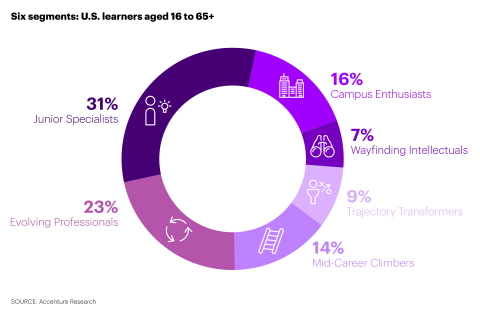New Accenture Research Offers Deeper Understanding of Post-Secondary Students and Opportunities for Educators

Six segments:
A new study, Serving all students: A survey of learner mindsets, reviews how the COVID-19 pandemic accelerated a number of changes that were already underway in higher education, such as a reduced pool of “traditional” students, an increasing societal need for lifelong credentialing and skilling and the rise of alternative education providers. These factors prompted the research to better identify and deepen understanding of distinctive segments of the “student” population to help colleges, universities and professional certification programs tailor their efforts to improve student satisfaction, equity, experiences and outcomes.
“Education institutions, now more than ever, are looking to evolve how they serve existing students as well as how they adapt to serve new student segments,” said
Finding 1: A new way to segment learners
The survey of 6,500+ post-secondary learners included current and prospective students age 16 and up, seeking either an academic degree or professional certification from any type of post-secondary education provider. Analysis of survey results revealed six distinct segments of learners, clustered based on learning mindsets, goals and emotions rather than demographic factors or type of institution.
“Campus Enthusiasts” representing
“Wayfinding Intellectuals” representing
“Junior Specialists” are the largest cluster, representing
“Evolving Professionals” representing
“Mid-Career Climbers” representing
“Trajectory Transformers” representing
Finding 2: Alignments in satisfaction within and across segments
Students across the diverse segments were relatively satisfied with how institutions describe their offerings and help students navigate program offerings and other academic advising. Satisfaction was lowest across all segments with non-academic services, such as mental health and wellness, disability services, and financial counseling.
The survey found every segment placed high priority on greater flexibility around coursework modality (onsite, online, and hybrid approaches).
Finding 3: Universal demand for high quality digital experience
Overall,
Delivery preferences for many key activities cut across segments. Majorities in all segments tended to favor in-person delivery for deeply relevant experiences such as graduation, internships and clubs/organizations, and to generally favor online delivery for most administrative services.
“Post-secondary education institutions need to be able to deliver nearly all services well across modalities, but it is about much more than just going digital” Fisher added. “The focus should be on deepening engagement and relationships with students and enhancing learning experiences, including by more thoughtfully addressing distinct needs and preferences of widely varying learners.”
To learn more about Accenture’s education work, please visit this site. To learn more about how Accenture’s Public Service industry group helps public-sector organizations embrace innovation and transform quickly to operate smarter, achieve more and improve services, visit Accenture’s Public Service industry portal.
About the Research
The survey included 6,536
About Accenture
Accenture is a global professional services company with leading capabilities in digital, cloud and security. Combining unmatched experience and specialized skills across more than 40 industries, we offer Strategy and Consulting, Interactive, Technology and Operations services — all powered by the world’s largest network of Advanced Technology and Intelligent Operations centers. Our 624,000 people deliver on the promise of technology and human ingenuity every day, serving clients in more than 120 countries. We embrace the power of change to create value and shared success for our clients, people, shareholders, partners and communities. Visit us at www.accenture.com.
View source version on businesswire.com: https://www.businesswire.com/news/home/20211025005065/en/
Accenture
+1 512 694 6422
joseph.r.dickie@accenture.com
Source: Accenture







